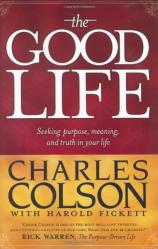The Good Life
Review
The Good Life
Charles Colson's big and bold personality comes through in all his books. But now, writing from beyond the ledge of three score and ten, Colson's voice seems a bit mellower. In some ways this is his most personal book (and easiest to read) since his first, the newsworthy BORN AGAIN. People interested in political history may well take note of the elder Colson's analysis of Nixon White House dynamics and personalities, including his take on the lonely, tragic death of John Ehrlichman.
The format of THE GOOD LIFE is classic Colson: he draws in extended third-person narratives to illustrate chapter themes. This pattern starts right off in the first chapter, summarizing the storyline of the movie Saving Private Ryan --- the circumstances that led the aged James Ryan to the Normandy gravesite of his army captain where Ryan wondered aloud if he had "led a good life." Colson then asks the question of himself and of his reader.
A second chapter recapping Colson's White House role sets up a chapter discussing four "great" paradoxes of the "good life": (1) "Out of suffering and defeat often comes victory." (2) "We have to lose our lives to save them." (3) "Freedom lies in…following the call on our lives." (4) "We have to understand the evil in ourselves before we can truly embrace the good in life." In a very subtle manner, these paradoxes mirror the book outline, which is identified not by the paradoxes but by a more ordinary search-and-find framework.
The first third of the book, "Searching for the Good Life," is often illustrated by people who've pursued the wrong venues and landed badly. Chapter 4, for instance, tells the story of the decadent and fraudulent Dennis Kozlowski, former CEO of Tyco International. The good life can't be bought. "What we truly long for isn't boundless riches. What we desire is a sense of significance and value --- human dignity," which can be found even in prison camps, exemplified by the persecution of Nien Cheng, author of LIFE AND DEATH IN SHANGHAI.
Part 1 further delves into the importance of community and leads to a short Part 2, "Giving to Others," which might correspond to the "losing oneself" paradox. "But to what end?" Colson asks, noting that there is no nobility in sacrificing for depraved purposes. The question (but to what end?) leads to the longest section of the book, "Searching for the Truth," which discusses the anti-relativism that defines much of Colson's previous works. Chapter titles include "Can We Know the Truth?" "Morality and the Natural Order," "The Gift of Knowing Right from Wrong," and "Postmodernists in Recovery." In one chapter, "What Is Life Worth?" Colson vulnerably talks of life lessons he's learned while relating to his autistic, adolescent grandson. "The good life is not about the sum total of what we contribute to the world. It's about loving." And "truth matters because without truth, love is unreal. It's just another sentimentality."
Colson's Part 4, "Living the Good Life" (which includes dying the "good death") and his epilogue bring him to blatantly (but not preachy) Christian themes, including the Gospel message. One chapter, "Providence," includes a discussion of God's good purposes, even in trouble, such as Colson's extensive hospital stay "a number of years ago" when he was unexpectedly able to talk about faith with a dying friend and former high-ranking government official. "Providence is often something that we understand only in retrospect. I look back on my life and see clearly the evidence of its invisible hand guiding my life at critical points."
You might not figure it from this non-narrative review, but THE GOOD LIFE is full of stories --- his own and others' --- and he, with co-author Harold Fickett, is a very good storyteller.
Reviewed by Evelyn Bence on June 1, 2005
The Good Life
- Publication Date: June 1, 2005
- Genres: Christian, Christian Living
- Hardcover: 416 pages
- Publisher: Tyndale House Publishers, Inc.
- ISBN-10: 0842377492
- ISBN-13: 9780842377492




